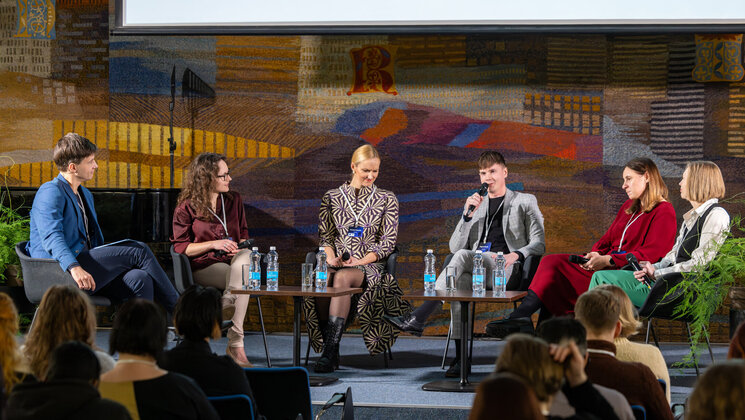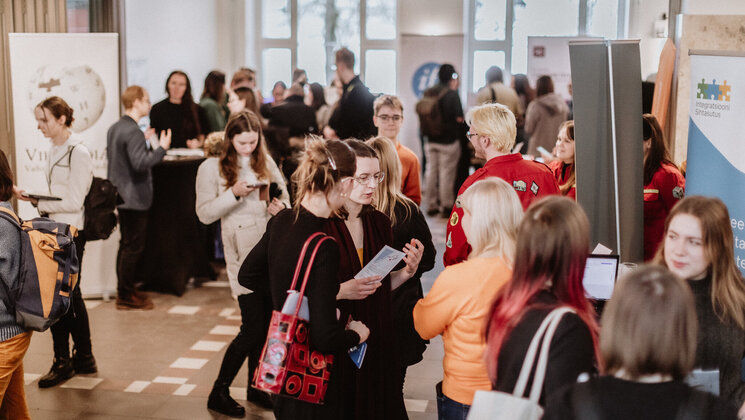Filosoofia bakalaureuse- ja magistritööde kaitsmised
Filosoofia bakalaureuse- ja magistritööde kaitsmised
Magistritööde kaitsmise ajaplaan on lehekülje lõpus.
Filosoofia eriala bakalaureusetööde kaitsmised
Teoreetiline filosoofia
1. juunil algusega kell 12.15, Zoom
Lilian Mõttus
Kas tehisintellekti teadvus on võimalik?
Juhendaja Bruno Mölder, retsensent Uku Tooming
Praktiline filosoofia
2. juunil algusega kell 14.15, Zoom
14.15 Oliver Daniel
Suveräänsuse mõistele värske lähenemise loomine Foucault’ ja Arendti teooriate valguses
Juhendaja Kadri Simm, retsensent Mats Volberg
15.00 Kärt Kangur
Haridusfilosoofia paradigmad põhikooli sotsiaalainete õppekava näitel
Juhendajad Mats Volberg ja Mari-Liis Nummert, retsensent Kadri Simm
Filosoofia ajalugu
9. juunil algusega kell 14.15 Jakobi 2-336
Martin Piir
Hans-Georg Gadamer ja kantiaanlikud kunstikäsitlused
Juhendaja Andrus Tool, retsensent Eduard Parhomenko
Filosoofia eriala magistritööde kaitsmised
Mani Rashtipour
What Do Law Statements Mean?
26/05/2022 12:00 noon Room: Zoom
Supervisor: Alex Davies
Reviewers: Nikolai Shurakov, Uku Tooming
Chairperson: Bruno Mölder
ABSTRACT: Many philosophers and scientists believe that the statements of laws of nature can be given a unified analysis. Law statements are thought to be true lawlike generalizations, where to be a lawlike generalization is to be a universal, spatiotemporally unrestricted, and modally robust generalization. It is a legacy of logical empiricists that such generalization can be analyzed as a universal generalization of the form ∀x.(Fx→Gx). Since the logical empiricists, this analysis has been criticized and various alternatives have been proposed. One proposed analysis is that lawlike generalizations, and hence law statements, should be analyzed as generic generalizations, which are quasi-universal generalizations like “ravens are black” that have no explicit quantifiers and tolerate exceptions (e.g. Drewery 1998, 2005; Nickel 2010; Claveau & Girard 2019). These accounts, however, endorse the assumption that law statements can be given a unified analysis and attempt to analyze law statements as generic generalizations in a unified manner. In this thesis, while endorsing the idea that law statements are generic generalizations, I will challenge the assumption that law statements can be given a unified analysis. I will argue that law statements should be divided into two distinct groups, definitional laws and descriptive laws, which require distinct analyses. I will, then, propose that an analysis of law statements that takes into account this difference can be provided using the distinction between definitional and descriptive generics. Finally, I will propose a semantics for law statements on the basis of the works of Manfred Krifka and Yael Greenberg on definitional and descriptive generic generalizations.
Bright Dua-Ansah
AGAINST THE GUISE OF THE GOOD
30/05/2022 2:00 PM Room: Jakobi 2, 337
Supervisor: Francesco Orsi
Reviewers: James Pearson, Uku Tooming
Chairperson: Alex Davies
ABSTRACT: The Guise of the Good thesis (GG) explains the nature of intentional action as aimed at accomplishing something that appears good to the agent. According to the GG theorist, without the belief that acting leads to results that the agent thinks are good, they would otherwise not act, or they will choose to act differently. This makes sense as an explanation of why people do what they do since we are unlikely to act upon attractions we see no good in - if we are doing so out of our deliberation. GG is distinct in that it distinguishes the actions of humans from mere impulses. The evaluative content attached to intentional actions under GG commits the thesis to a necessary explanation of intentional action. In a way, the Guise of the Good thesis has become the standard account of action theory. I argue that it is not the case that whenever we act intentionally, we are acting under GG. The thesis cedes too much power to the agent in justifying the goodness of their action. Secondly, clear cases exist where people act intentionally without seeing anything good about it.
Jared Smith
On how God became pocket-sized: Digital Machination's Challenge to Active Nihilism
31/05/2022 2:00 PM Room: Jakobi 2, 337
Supervisor: Siobhan Kattago
Reviewers: Ave Mets, Jaanus Sooväli
Chairperson: Alex Davies
ABSTRACT: This thesis examines how digital technology has created an individualized environment of understanding which threatens genuine value creation in an individual and collective. Whereas television, through machination of information mediums in the 1960s, created a hyperreality of understanding at the macro level, society, digital technology operates on the micro level, the individual. The development and use of digital technology, such as social media or online entertainment content, has created an understanding in users which appears to be active nihilism, but is in actuality passive nihilism, and perhaps even creating Digital Last Men.
Nada Mohamed
A Taxonomy of Testimonial Smothering
1/06/2022 10:00 AM Room: Jakobi 2, 336
Supervisor: Simon Barker
Reviewers: Jaana Eigi, Jimena Vazquez
Chairperson: Alex Davies
ABSTRACT: Kristie Dotson formulates testimonial smothering as a form of testimonial oppression where a speaker truncates or removes the content of her testimony leaving the testimony empty from any content for which the hearers demonstrated testimonial incompetence. On Dotson’s account of smothering, the speaker empties her testimony from all content relevant to the domain of exchange. However, Dotson’s account does not include or cover instances where a speaker smothers her testimony, yet her smothered testimony contains some content relevant to the domain of exchange. In this thesis, I present a more detailed analysis of testimonial smothering to showcase different ways in which oppressed speakers interact in exchanges in which they are oppressed. I take Dotson’s notion of smothering to be one form of testimonial smothering, which I call smothering via emptying. I introduce two other types of smothering, smothering via altering and smothering via echoing, to encompass cases where a speaker’s smothered testimony is not empty from content relevant to the domain of exchange. Then I use the taxonomy of testimonial smothering to showcase ways in which oppressed speakers can contribute to conversations in which they are oppressed.
Waqar Ahsan Qureshi
Why There Is No Free Will and Why Compatibilism and its Notion of Free Will is Wrong
14th June at 10.30am in room 337, Jakobi 2
Supervisor: Maria Jimena Clavel Vazquez
Reviewers: Bruno Mölder, Francesco Orsi
Abstract: In my thesis I try to make a point that, why there is no free will, which is the ability to purposefully do otherwise. In our everyday life we live as if we are causing our thoughts and actions but upon close scrutiny we can see that it is impossible to do such things. Because we are part of a deterministic universe which is following a casual chain. And to solve this problem of, if we are in a deterministic universe then we can't have free will, compatibilism has come up with a solution. Which also at close scrutiny fails to withstand its claims






